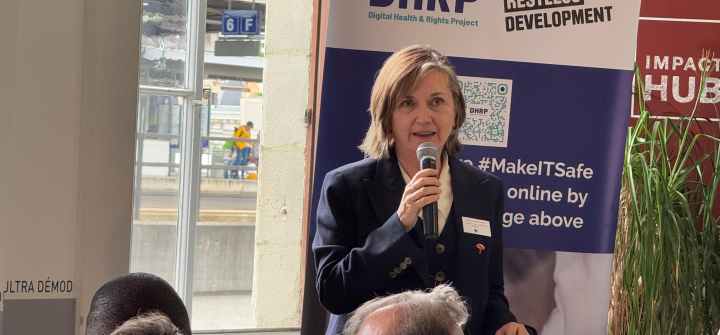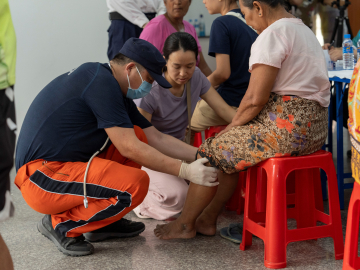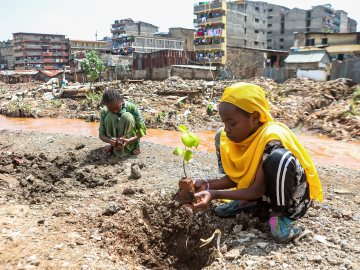Online Abuse Is Undermining the Right to Health
“There is so much stigmatization … I have limited myself from posting on social media. … If I post anything, anyone will come and say: ‘You posted about HIV, are you a member of that community?’”
This is the reality for too many young adults in low- and middle-income countries today. Digital health can empower, but only if it protects; guardrails are essential to ensure these tools deliver on their promise. This is not just a digital safety concern—it is a critical public health issue. Without safety, privacy, and access, the right to health cannot be realized online.
As some global health leaders champion digital innovation, a quiet human rights crisis is unfolding online. A new international study we co-authored, “Paying the Costs of Connection,” exposes how digital health is failing some of the young people who need it most. The study, published by The University of Warwick’s Centre for Interdisciplinary Methodologies, focuses on Colombia, Ghana, Kenya, and Vietnam, and reveals increasing online abuse of young adults living with HIV, LGBTQ+ people, sex workers, and other marginalized groups—many of whom rely on digital tools for essential health information and support. Frontline HIV activists have also been targeted.
Of the 300+ young adults we spoke to in focus groups and in-depth interviews for the study, more than three-quarters described how they or their peers were harassed, blackmailed, stalked, or threatened online. In Kenya, a young woman was evicted at age 14 when a health care provider texted a reminder about her HIV status to a phone she shared with family. In Ghana, a gay man was lured to a meeting through months of fake romantic messages, then ambushed by men carrying machetes and sticks. In Colombia, transgender sex workers were stalked to their homes after their details were shared online without consent. In Vietnam, a young man’s social media accounts were hacked, and his image was doctored and sent to his contacts.
These abuses aren’t just horrifying—they are becoming normalized. Victims rarely see justice. Some are criminalized instead, especially in places where same-sex relationships are punished by law. Police often dismiss complaints. Tech platforms fail to respond. And the fear of exposure leads many to stop seeking care altogether.
These harms deepen inequality. Participants spoke of sharing phones when they couldn’t afford private phones, exposing them to the risk of being outed. Others described gendered restrictions, with women and girls dependent on partners or parents for access to phones or the internet.
What’s at stake is more than online safety. The UN recognizes access to online health information as a core part of the right to health. But that right is being denied. Governments and global health institutions must act.
We call on UN agencies, health ministries, and lawmakers to:
- Take urgent action against technology-facilitated abuse. That means implementing strong laws, survivor-centered support systems, and accountability for platforms and perpetrators.
- Strengthen privacy protections and ensure everyone knows their digital rights.
- Invest in digital inclusion so that no one is excluded from care because they can’t afford data or a safe device.
Support youth leadership so that digital health policies reflect the lived experiences of young adults themselves.
Meg Davis, PhD, MA, is a professor of Digital Health and Rights at The University of Warwick’s Centre for Interdisciplinary Methodologies in Coventry, England.
Bernard Koomson, PhD, MSc, is a postdoctoral fellow at The University of Warwick’s Centre for Interdisciplinary Methodologies in Coventry, England.
Catalina Gonzalez-Uribe, PhD, MA, MSc, is a research scientist at the Center for Sustainable Development Goals for Latin America and the Caribbean, Universidad de los Andes in Bogotá, Colombia.
Allan Maleche, LLM, LLB, is the executive director of The Kenya Legal & Ethical Issues Network on HIV and AIDS (KELIN) in Kenya.
Join the 50,000+ subscribers in 170+ countries who rely on Global Health NOW summaries and exclusive articles for the latest public health news. Sign up for our free weekday newsletter, and please share the link with friends and colleagues.
Professor Meg Davis, a co-author of the Paying the Cost of Connections report, speaks at a World Health Assembly side event titled Overcoming Barriers to Digital Health: Protecting Human Rights and Preventing Online Harm in the Digital Health Transformation. May 21, Geneva, Switzerland. Image: Eglah Wandurwa, courtesy of The University of Warwick's Digital Health and Rights Project.








